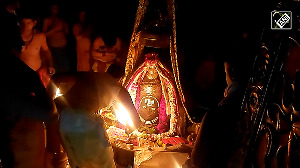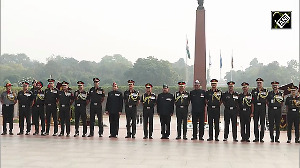Pressing the international community to speak up for the Tibetan people at this "critical" stage, the Dalai Lama on Wednesday prodded China for progress in the ongoing talks over the grim Tibet situation as the two sides met in Beijing for the second day of the secretive parleys.
"Tibet today is passing through a very critical period with the very survival of the Tibetan people at stake. The situation in Tibet continues to be grim," the exiled Tibetan leader said attacking Beijing for "eroding the Tibetan people's distinct cultural and spiritual heritage".
In a letter read out to a conference in Tokyo, the Dalai Lama said the fresh round of talks that opened on Monday in Beijing "has come at a crucial time."
The Tibetan government-in-exile based in Dharamsala has said the envoys of the Dalai Lama will hold talks with Chinese officials for two days, resuming the dialogue which started in May in Shenzen following the deadly riots that broke out in Tibet in March.
The protests had rattled the Communist party leadership, leading to a massive crackdown which drew international flak. The Chinese government, which has remained tightlipped on the talks, however, poured vitriol against the exiled Tibetan leader accusing him of orchestrating the protests in Tibet "with the support and instigation of hostile Western forces".
"The March 14 incident was planned for a long time by the Dalai clique with the support and instigation of hostile western forces," Zhang Qingli, Tibet's hardline Communist Party boss said. "They harboured evil intentions of turning the incident into bloodbath, of disrupting Beijing Olympics and destroying Tibet's stability and political harmony," Zhang was quoted as saying by the official Tibet Daily.
The Chinese foreign ministry said on Monday that it hoped the contact and dialogue with the Dalai Lama's side could make "positive progress" but declined to be forthcoming even on the venue and schedule of the talks. "As far was we know, officials from the central government will have contact with the private representatives of the Dalai Lama," was all foreign ministry spokesman Liu Jianchao was willing to say on the talks, seen as an attempt by China to ease tensions ahead of the Beijing Olympics whose torch relay whose marred by pro-Tibet protests.
The Dalai Lama alleged that "China's current unremitting efforts to assimilate Tibet are eroding the Tibetan people's distinct cultural and spiritual heritage. For this reason it is important for the international community to speak up on behalf of the Tibetan people," stressing that he was not anti-China and wanted a solution within the Chinese constitution.
The Dalai Lama voiced hope that the "talks will contribute in making some marked improvement in our discussions." Major powers led by the US have nudged Beijing to end the crackdown and resume the dialogue with the Dalai Lama whom China has persistently accused of having masterminded the riots in Tibet, a charge the Tibetan spiritual leader has denied.
The two sides have held six round of talks since 2002 but not much headway has been made. Amnesty International claimed that China was holding more than 1,000 Tibetans without any charge.





